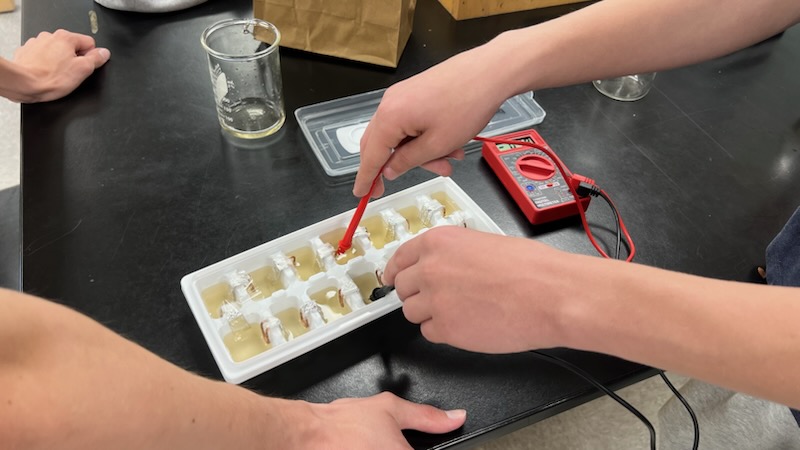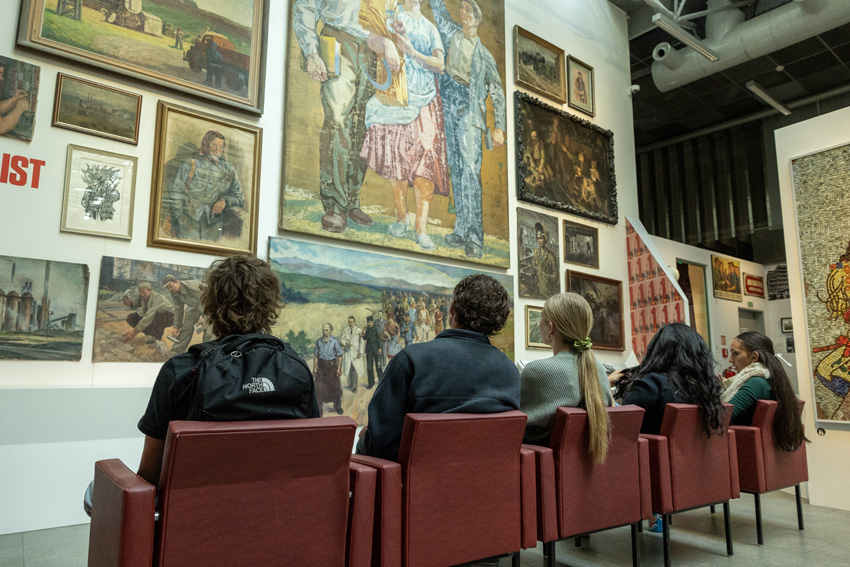Sizzling, popping and cracking pervade the room as fries fry and burgers burn. Hurriedly shouted directions and drive-thru orders crackling over the loudspeaker create a kind of organized pandemonium.
Employees rush back and forth between registers and drive-up windows rapidly filling orders and helping customers; welcome to life in a fast food restaurant.
For many students, a job seems like a necessity in a world mainly concerned with material possessions and the desire for independence. Cars, insurance and spending money, the “necessities” for most students, are often hard to come by.
Gabriel Hawkins, ’04, needed a job so that he could pay for his truck and the insurance to go with it. He was hired almost a year ago after applying at In-n-Out Burger.
From making fries, cleaning up the backroom and working registers to manning the drive through, Hawkins said his fellow employees are friendly to work with and the atmosphere is pleasant.
“In-n-Out is a great place to work,” Hawkins said. “The managers are great and I am treated right. Not to mention, we get Christmas and Thanksgiving off with pay. I make $8.50 an hour and we get paid vacation.”
Conflicts between work and school are almost nonexistent for Hawkins. His schedule allows him to have a free eighth period, giving him time to work after school.
“I really don’t have any conflicts,” Hawkins said. “Everyone totally works around my schedule; it’s great.”
The merits of working during high school are often debated. Jon Endicott, vice principal, reminds students that part-time jobs can have negative long-term effects.
“It can definitely lead to trouble in the long run,” Endicott said. “Students who make work a higher priority then their academics can run into trouble. Most colleges use a graduated scale to determine scholarships, based on GPA. The higher GPA you have, the more money you can receive. Students who let their grades suffer might not be able to get into the college they want–that can really hurt their futures.”
Hawkins’ perspective teaches a lesson in compromising work and school.
“It all depends on how busy you are,” Hawkins said. “If you get involved in something at school, it makes it hard to keep up. Otherwise, it’s a good way to earn money and learn responsibility.”
Danae Cook, ’05, also wanted a car and needed to earn the money for it. After applying and interviewing at Jamba Juice, Cook was hired and has been working there for three months.
“Working there is OK,” Cook said. “I guess I like it, but there is a lot more work that goes on behind the scenes than most people would think.”
Most working teens find that they are not responsible for doing just one job, but for filling in wherever they are needed.
“Actually I do just about everything,” Cook said. “I make the smoothies; I spill the smoothies. I clean up after I make the smoothies and I do the dishes from making the smoothies. I also work at the register, take people’s money and have water wars with my co-workers.”
For many campus students, the idea of juggling work schedules and homework loads sounds nearly impossible. Cook is one of many who have learned to keep up with both.
“There aren’t that many conflicts between my work and school schedules,” Cook said. “For the most part everything works out, of course occasionally there are times when my schedule for cheerleading and my work schedules conflict. Also, I don’t see my family as much anymore; we hardly ever all have dinner together.”
Cook says the scene at Jamba Juice is positive, the people are friendly to work with and the only thing that makes Cook uncomfortable is cleaning the boy’s bathroom. Her experience at work has given her an upbeat attitude about the working world.
“I think getting a job in high school is definitely a good idea,” Cook said. “People need money for movies and other activities; they won’t be able to borrow money from their parents forever. It’s a good experience.”
Not all students have such a positive outlook on the working world. Mandi Estes, ’05, does not like her job, working in a booth in the Crafter’s Palace.
“I got the job from one of my mom’s friends,” Estes said. “The thing I hate about it is that the other people who work there are not friendly at all. I don’t have any friends at work.”
Having to pay for everything and not having time to do much with friends has drastically changed her life. Estes got a job because after getting her license, she was required to pay for car insurance and gas if she wanted to drive.
“I really don’t think it’s a good idea for people to get jobs in high school,” Estes said. “A lot of people think that they have to get a job in high school but my advice is: unless you absolutely have to work, don’t bother.”
Getting a job in high school is not a requirement; however, those who do work often learn responsibility and are given a peek at what life after high school will hold.
For information concerning In-n-Out restaurants go to www.in-n-out.com/ or visit Jamba Juice at www.jambajuice.com/. An article was posted on the University of Michigan’s website called “Part-time work for high schoolers may cost more than it pays;” to view this article visit http://www.umich.edu/ urecord/9293/Mar29_93/21.htm.






